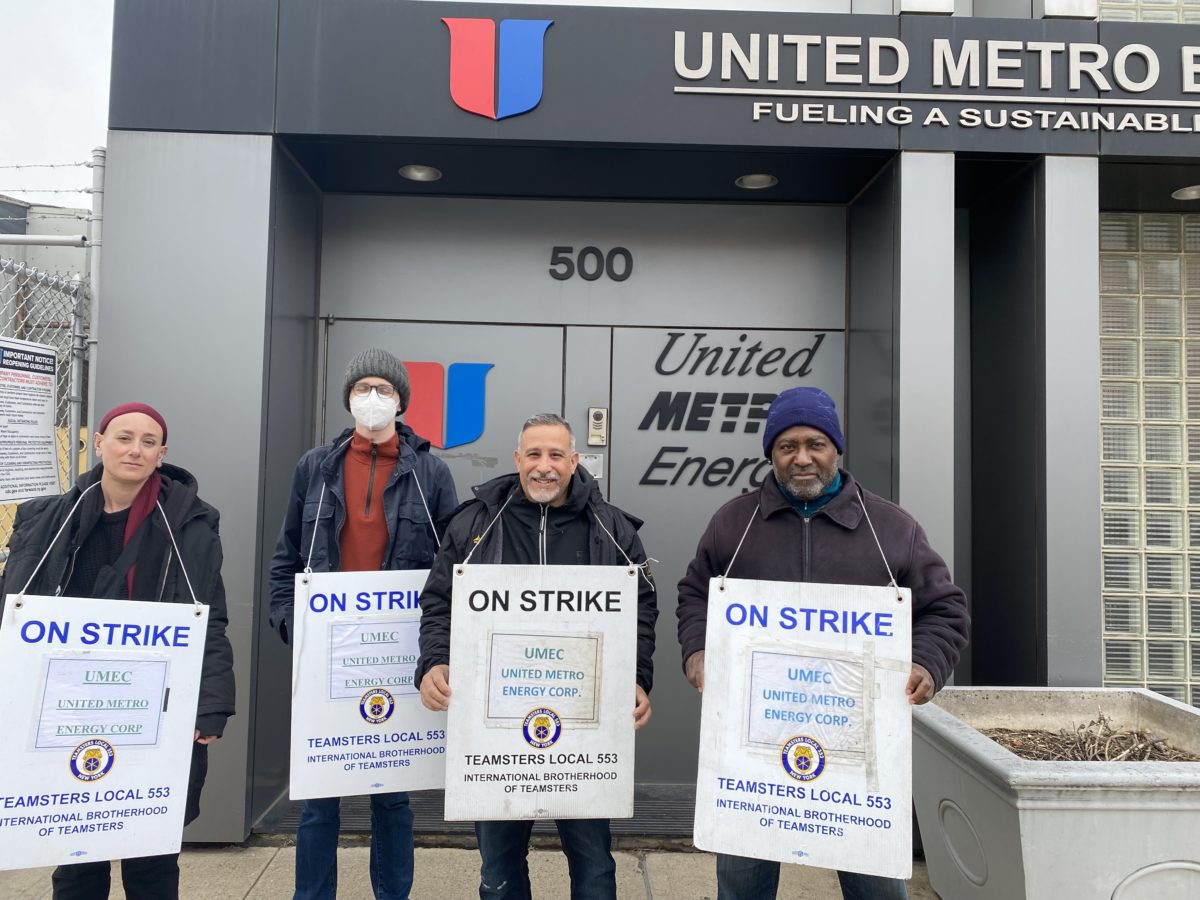UMEC on strike for nearly 11 months

UMEC workers striking outside of their workplace
By Matthew Fischetti
The workers at United Metro Energy Corporation (UMEC), one of the largest energy producers in the city, have been on strike for nearly 11 months.
They have been standing outside their Greenpoint workplace every Tuesday from 9 a.m. to 5 p.m. since April 19, 2021. Throughout the heat, throughout the rain, throughout the cold winter months and throughout the pandemic; they have been fighting for better wages, better healthcare and for a better workplace.
Ivan Areizaga, who has been working at UMEC for over five years, said that he is on strike but is not looking for a ‘handout.’ He just wants to be paid what he and his co-workers deserve. In his five years of employment, the only days he missed were when his mother passed away. He returned to work three days later.
“We dedicate ourselves to work to be loyal. But the bosses and owners are not loyal to us,” Areizaga told The Greenpoint Star.
A few months into the strike, John Catsimatidis, the billionaire CEO of Red Apple Group, sent a letter to some of the striking workers that they would be “permanently replaced.” Striking workers said they were paid $26.78, which is $10 less than the industry average. When the replacement workers were hired they had a starting wage between $30 and $32.
In an interview with The Greenpoint Star, Catsimatidis said that the figure was an “unfair extrapolation” and represented an “apprentice wage.” Paystubs from April 2021 reveal that terminal operators were paid $26.78 per hour.
Castimatidis also claimed that between February 2019 and April 2021 that the union had never met with management and blamed COVID-19.
Demos Demopoulos, the principal officer of Local 553, refuted those allegations and provided several dates from his calendar of virtual bargaining sessions that were held.
Castimatidis and the Red Apple Group did not respond to requests for a follow-up interview.
Local Teamsters 553, the union representing UMEC workers, has three open cases for unfair labor practices against their employer, according to the National Labor Review Board’s case search. The cases include claims of the company refusing to bargain in good faith, coercive statements and discriminating against union employees.
Areizaga, a father of four, said that UMEC’s inability to come to the bargaining table has put a significant financial strain on his family. One of Areizaga’s sons is type-one diabetic, and was unable to get his medication due to losing health benefits.
“I just thank God nothing bad happened,” Areizaga said.
Andre Soleyn, the strike captain and father of three daughters, echoed the financial strain the strike has placed on his family.
“We have to literally sit down and budget every penny that I could use. There’s nothing extra, I have to budget down to how many trips I can take to the grocery in a week. And that’s very exhausting,” Soleyn said. “It’s hard for me to look in their eyes sometimes and say, ‘Okay, we can’t – because they don’t ask for anything extra. They ask for the bare necessities.’”
Striking workers had six months of unemployment but have been relying on a GoFundMe fund ever since. To date, the fund has raised $13,786.
Union members on strike also expressed concern about the safety of UMEC hiring what they say are unqualified workers to handle the dangerous and technical work of operating the facility.
“I’m not running some kind of Mickey Mouse operation,” Catsimatidis said on the claims that the workers weren’t properly trained or licensed to operate the facility.
“They [workers on strike] know how difficult it can be to obtain those certificates of fitness from the fire department, because they are specific to the terminal. And it takes time and effort to study and be taught. So there’s no way that in the amount of time that he fired these replacements that they were having, you know, had all the proper qualifications,” Demopoulos said.
“We’re willing to fight now more than ever. Because look at all of the other strikes that have been going on like John Deere, Warrior Met Coal, Columbia teachers [referring to the graduate student union], and so forth… just to name a few,” Soleyn said. “All of that is part of that labor movement that we’re a part of. Saying enough is enough. We need to be paid what we are worth. We put our lives on the line, we did everything necessary to keep this place open while they were at home.”

